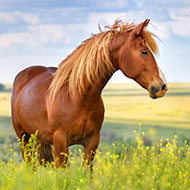
Leading equine and gastroenterology experts to share their knowledge
Details for the 13th International Equine Colic Research Symposium, to be held 15-17 July 2020 in Edinburgh, have been released.
The triennial event presents a unique opportunity for equine vets to absorb and digest the latest clinical practice and scientific advances in the treatment and prevention of colic. This year’s meeting will see some of the world’s leading equine and gastroenterology experts deliver talks on surgical techniques, parasitology, gastric ulceration and epidemiology, amongst many other topics.
After each session, delegates will be able to ask questions and discuss the topic in question. Poster sessions on the first two days of the event will expand on the oral presentations, with delegates able to review and discuss the work with presenters.
Before the symposium, delegates can book a two-day advanced course on colic surgery (13 -14 July). This course will include a day and a half of lectures, presented by David Freeman from the University of Florida, followed by a half-day of practical sessions.
“Our colic symposium is always very popular; nowhere else will you find so many leading practitioners and researchers from around the world sharing their knowledge, experience and ideas via more than 120 oral and poster presentations,” said BEVA President Tim Mair. “With our colic surgery course neatly timed to tie in before the start of the symposium delegates can optimise use of their time and enjoy 4.5 educational days in beautiful Edinburgh.”
The deadline for submissions of abstracts for presentation at the meeting is 1 February 2020. The scientific committee will consider abstracts on all aspects of equine gastroenterology, including basic science research and reports of clinical cases or novel approaches to treatment.
The symposium is hosted alternately by BEVA and the American Association of Equine Practitioners. For more informartion about the symposium and to book online visit beva.org.uk/ColicSmposium



 The Veterinary Medicines Directorate (VMD) is inviting applications from veterinary students to attend a one-week extramural studies (EMS) placement in July 2026.
The Veterinary Medicines Directorate (VMD) is inviting applications from veterinary students to attend a one-week extramural studies (EMS) placement in July 2026.